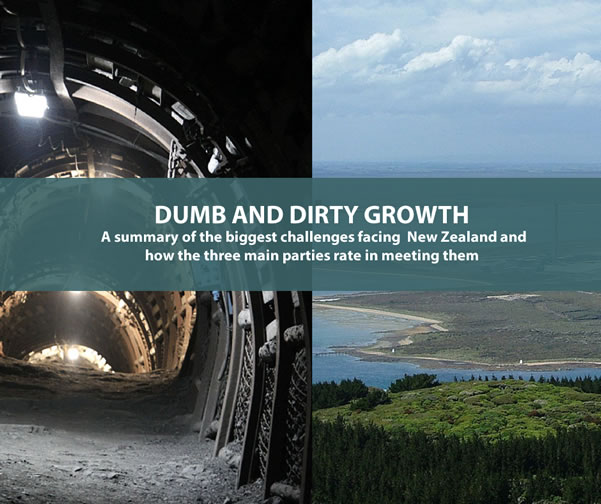Over the course of this election campaign there has been a lot of focus on dirty politics, spies and conspiracies, and tragically way too little on policy. Those stories will no doubt continue to be discussed long after the vote counting stops but with election day upon us, at least a little attention to the adequacy of party’s policy offerings might be relevant.
We have prepared a pre-election guide entitled Dumb and Dirty Growth. It includes a summary of the biggest challenges facing the country and how the three main parties rate in meeting them. The document is a summary of our research over the past six years, which together presents a plan for how the country could switch to raising prosperity in a clean, clever and equitable way.
You can download the document here
Download now or Read online nowDumb and dirty growth is stuff that makes us richer in the pocket, but poorer in other ways. Over the past few years there has been a lot of talk about trade-offs between the economy, society and environment. This approach is short sighted – we can have it all, but we have to be smarter about how we do things.
To illustrate dumb and dirty growth, the paper uses the example of draining a wetland to use for dairy farming. Given how rare they are, preserving the few wetlands we have left is far more valuable to New Zealand than a few extra dollars in milk revenue. One study has placed the total value of a wetland at $48,000 per hectare (this includes all the environmental services it provides like cleaning water, providing habitat for fish and birds), compared to $2,000 for using the same land for dairy farming.
The paper rates the parties on a variety of policy areas, and as you can see in the table below, the striking thing is the number of zeros. This is because our three main parties are either avoiding dealing with the big issues, or because the solutions proposed won’t cut the mustard. We have deliberately not tallied the ratings up or told people how to vote – your choice depends on which issues you think are most important. The important thing is to vote – otherwise you have no reason to whinge for the next 3 years.
What concerns us the most, given the likely re-election of National, is their plans for Resource Management Act (RMA) reform. The RMA is far from perfect, but National wants to strip out environmental protections in favour of economic growth. Put simply, if growth doesn’t generate enough wealth to improve the environment overall (societal, economic and physical), then we aren’t really better off.
What separates this election guide from others is that it doesn’t take the policies on face value. Most election guides simply register that parties have a policy in a certain area, and don’t even cost those policies or assess whether they’ll work. So they’re pretty useless to voters. This one looks at whether the policy would be able to actually make a difference to the issues that matter. The problem often is that politicians like to look like they are doing stuff, but the reality is their efforts are more show than substance.
Our Dumb and Dirty Growth paper only looks at the three main parties – National, Labour and the Greens. That is because these are the only parties with coherent policy platforms, backed up by a tax and spending plan. Beyond the three main parties the depth of policy thought tails off pretty quickly. Most of them have good intentions, plenty of idealism but they haven’t set out a credible plan for how they will pay for their ideas, so they can’t be taken seriously.
The table below summarises the issues we look at in the report and the ratings we give each party (out of a maximum of 3) on their efforts to adequately address the challenges:


